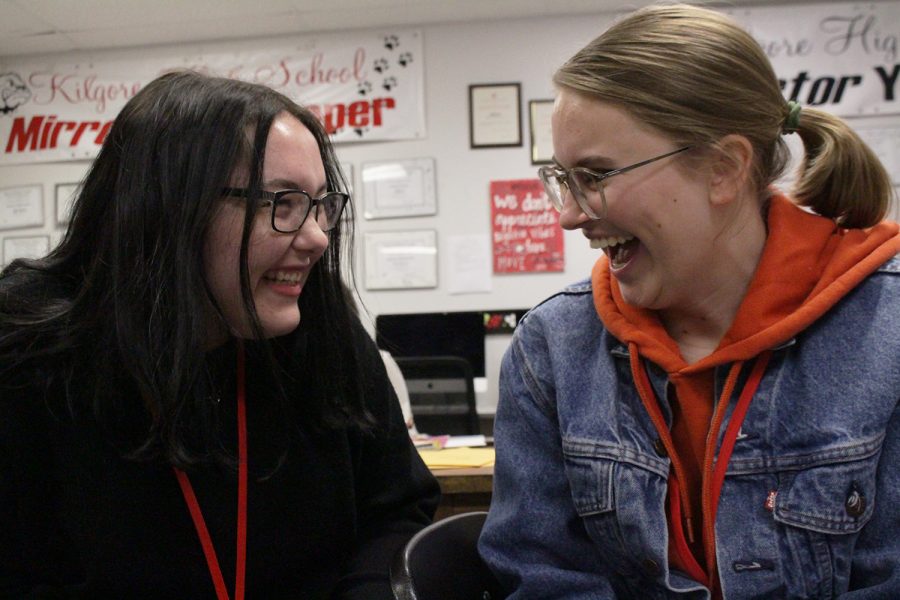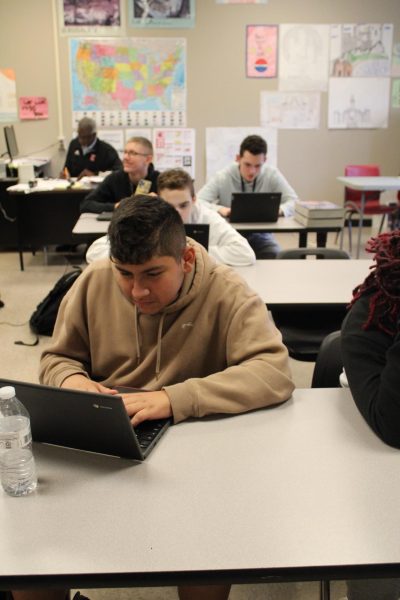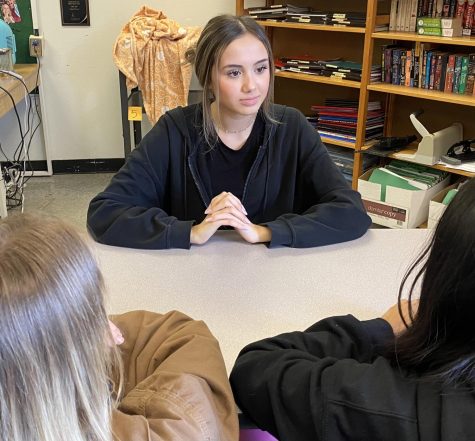I’m not like other girls
Junior Carley Dollins and freshman Olivia Blundell burst into laughter after a joke.
Girls are so dramatic. They only care about makeup, fashion, and boys. They suck at sports and they’re always giggling with their friends about nonsense. But her…she’s different. She’s natural. She’ll eat around boys and play games with them. She is not like other girls.
Almost all girls have heard this phrase tossed around for their entire lives. Whether they’ve been told that they themselves are not like other girls or they identify as such, it’s been deemed as a compliment the entire time. But why is it a good thing to not be like other girls? What’s wrong with these ‘other girls’?
It all begins with traditional gender roles and stereotypes surrounding them. For example, girls are expected to like clothes and makeup. Girls are expected to be soft-spoken, passive, and sweet. These traits are titled ‘girly’ by society. Therefore, the phrase ‘not like other girls,’ refers to the rejection of these stereotypical girly characteristics.
This phrase is very intertwined with the patriarchy. The patriarchy is a sociopolitcal and cultural system that values masculinity over femininity. Through this patriarchal society women and their interests are valued less than those of men.
It also seems like society enjoys putting people into categories of familiar groups and predictable types. For example, people will say that there are two types of girls. Preppy and stuck-up or cool and laid-back. However, labels such as these are false dichotomies. Labels such as that are not the only thing girls are limited to, nor are they mutually exclusive.
Regardless of if they’re false, everyone is deeply influenced by the gender roles and stereotypes we see from a young age.
This begins the negative trait of comparing ourselves to other girls. Questions begin to arise surrounding if we want to be like other girls. We wonder if we can fit into those stereotypes or if we should want to.
However, a boy could have told us that we weren’t like other girls in a positive way, thus causing us to believe that it’s a good thing. We start to enjoy and believe that compliment. We would never want to be like other girls. We’re just different.
When women start to believe that they’re different than other girls, they also gain a sense of superiority over other women. They’d be insulted to be compared to the basic girl. They take that label to be more well-liked. While this a very poor method to become more liked, it may be used as a defense mechanism for some women. If a girl doesn’t fit in well with other girls, it could be a sense of insecurity. They take this difference and claim it as a positive thing.
Male approval is something women are taught to crave from a very young age. Certain women seek the approval of men as a group because as a group, men seem threatening and more likely to hurt someone’s feelings.
This all leads to a term called internalized misogyny, and even though misogyny is described as “hatred, dislike, or mistrust of women,” many women experience internalized misogyny. This is expressed by them minimizing the value of women, mistrusting women, and believing gender bias in favor of men. This is all a product of how we’re raised and it’s not anyone in particular’s fault.
It can take a long time to unlearn this behavior after years of instinctually putting other women down or thinking of yourself as better in some way. It takes work to stop those thoughts, and you can’t just suppress them and change them. Being more kind and less judgmental of yourself and other women is not an easy process.
Something that might help this behavior is an increase of female role models. If representation in a field you’re interested in is lacking, it may make you feel like you can’t pursue a certain thing. The status quo perpetuates stereotypes and gender roles, and if more women role models are portrayed we can more easily break the stigma.
I believe that we are all like other girls. There are so many strong, powerful, and influential women surrounding us that it’s a great thing to be like other girls.
Rather than putting women down for liking typically feminine things, we should bring one another up for people being themselves.











